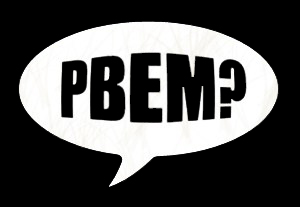Post by Donald (Panda) Spix on Jan 7, 2019 2:22:11 GMT

PLAY BY E-MAIL
By
On a rainy Sunday afternoon in the mid 80s, the clatter of dice on a glass table top and jubilant shouts at a critical hit introduced me to Roleplaying Games (RPG). We had our choice of games; BattleTech, Robotech, Star Trek, Marvel Superheroes, Rifts, Cyberpunk and Dr. Who.
I worked all week fixing airplanes for Uncle Sam, anticipated the weekend with friends, clustered in one or another’s living or dining room table. Dice rolled, and we adventured vicarious lives in alternate reality.
It was heaven.
But real life advanced and those days came to an end. A new town meant new friends and a new gaming group. Eventually, I moved back home, and gaming became virtually non-existent with too little time and children to raise.
But that wasn’t the end; it was merely a turn into the future.
I was working in tech support in 1999 when a message on ICQ invited me to join a Star Trek based Play By Email RPG (PBEM-RPG). I had no clue what it was, but the guy had me at ‘RPG’. I created a character, a Klingon named T’Ehklah and my online gaming experience began.
A PBEM isn’t limited by geography. We played with people around the world. It also doesn’t rely on dice to determine the outcome of a player’s actions, so we had to learn to trust one another to stay within the limits of our character’s knowledge and personality. Our particular game was so successful that it endured 15 years before we closed her down due to lack of participation.
So, what is a PBEM, you ask?
I worked all week fixing airplanes for Uncle Sam, anticipated the weekend with friends, clustered in one or another’s living or dining room table. Dice rolled, and we adventured vicarious lives in alternate reality.
It was heaven.
But real life advanced and those days came to an end. A new town meant new friends and a new gaming group. Eventually, I moved back home, and gaming became virtually non-existent with too little time and children to raise.
But that wasn’t the end; it was merely a turn into the future.
I was working in tech support in 1999 when a message on ICQ invited me to join a Star Trek based Play By Email RPG (PBEM-RPG). I had no clue what it was, but the guy had me at ‘RPG’. I created a character, a Klingon named T’Ehklah and my online gaming experience began.
A PBEM isn’t limited by geography. We played with people around the world. It also doesn’t rely on dice to determine the outcome of a player’s actions, so we had to learn to trust one another to stay within the limits of our character’s knowledge and personality. Our particular game was so successful that it endured 15 years before we closed her down due to lack of participation.
So, what is a PBEM, you ask?

As the name implies, players post character actions either by email to a forum, or by posting directly on the forum itself. It is a text-based game that requires the players to read and respond to fellow gamers’ posts as if they were participating in a table top RPG. Unlike table-top, this type of game is not typically combat oriented because it doesn’t use the roll of dice to determine a player’s success or failure. Instead, this is a game focused more on exploration and character building; a more man vs. world approach. A collaboration, so to speak.
Be prepared for negotiation and keep an open mind…
These games usually require a detailed character bio created prior to play. This creates a framework for the character’s limitation and abilities. The purpose is two-fold:
It gives the player a mental picture of the character and his/her abilities and how they fit within the game world. And
By creating that framework, the other players and moderators can expect the player to write within the character’s parameters and not go ‘off script’ without good reason.
Each game may vary on how much detail is expected in a character bio, which is determined by the game’s moderator. Before joining any game, you need to speak with the person in charge to understand the game’s requirements for a character bio. A good rule of thumb is…if it’s not in your bio and not logical for your character to already know, then don’t assume that they do.
Most games also post an FAQ section that allows new players to see how game play runs before joining and some offer a limited time ‘lurker’ status. Being a lurker is a good way to get the feel for a particular game before throwing your character to the wolves, so to speak.
Trust, honesty and integrity are requirements of this kind of game. Most games have a ‘no killing other players’ rule, and some have expanded that to ‘no using the other player at all without permission’ rule. Be prepared, because sometimes that rule, though it sounds easy to follow, is not that easy in practice.
Take a conversation between two players’ characters for example. Do you want to post a single question and wait for the other character to respond? Or do you take a leap of faith and post a conversation between two characters on your own, trusting that you are posting the other person’s character correctly? Trust is a huge factor in this, and it is up to the moderator to determine which process is correct for the game. And again, this is something you should find out prior to joining the game.
Just as with writing, each PBEM game has a sense of pacing. And a game’s pacing is largely based the posting requirements. Posting requirements are not always flexible in PBEM games, otherwise the game play can get bogged down in wait time. These can range from real-time gaming to monthly posting.
Real-time gaming is a variant of PBEM requiring the participants to be online during a gaming session, much like table top game. These can also include the use of a random number generator or computer-controlled dice roller; something that is not typically used in a traditional PBEM. In my opinion, this kind of game bridges the gap between PBEM and the ever-popular MMORPGs now dominating the online gaming arena. Real-time PBEMs are still listed in online databases right beside traditional PBEMs, so read the game choices carefully.
Traditional PBEM games generally have more relaxed posting requirements. Some require a daily check of the forums email, and a reply post. These are usually the fastest moving games. Others require weekly (the most common) or monthly participation. Bear in mind, the less frequent the posting requirement, the slower the game is expected to move. The key to finding the right game for you is understanding your own personal posting availability. Pick one that’s too slow and you can find yourself pacing the floor, anxiously waiting for a reply to your last post. Or pick one that’s too fast and you find yourself playing catch up, reading for hours to catch up only to find yourself left behind in the overall scheme of the game.
PBEM games break the barriers of geography and time by giving gamers a flexibility to participate in an RPG when they have no opportunity to gather with friends in real life. PBEM games also give creative writers an outlet to collaborative writing with a group of like-minded individuals. And in truth, there is a large cross section of these two groups that thrive of writing to a PBEM RPG, making this form of gaming far more popular than you might expect. These games, often based on television series, movies, and books, are a great place to start if you want to vicariously live in a setting you admire. So, create a character and look for a game online. Here’s two database links to get you started:
Ongoing Worlds and PBM.com
And if you still have questions, check out Brandon Blackmoor’s FAQs about PBEMs! He goes into a lot more detail than I have here.
Maybe I’ll see you out there on a starship somewhere!
T’ehklah Klarus tai tLquoQ
Former Chief Engineer, USS AUDACIOUS 60650


